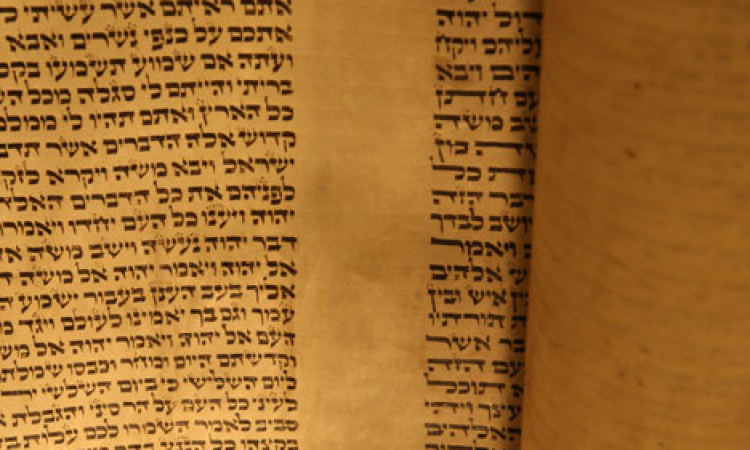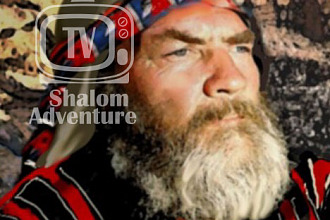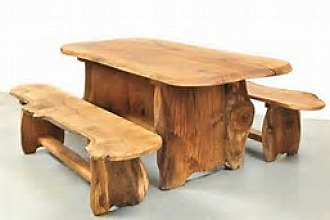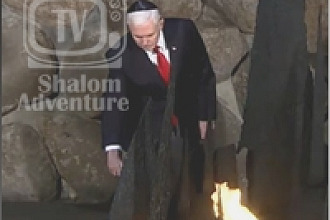Parasha for the Week: Chaya Sarah Genesis 23:1 – 25:18
Haftarah for the Week: 1 Kings 1:1 - 31
Besorat Yeshua: Mark 11:1 - 14
Overview
Sarah, Mother of the Jewish People, passes on at age 127.
After mourning and eulogizing her, Avraham seeks to bury her in the Cave of Machpela.
Avraham pays its owner, Ephron the Hittite, an exorbitant sum.
Avraham sends his faithful servant Eliezer to find a suitable wife for his son, Yitzchak, making him swear to choose a wife only from among Avrahams family.
Eliezer travels to Aram Naharaim and prays for a sign. Providentially, Rivka appears.
Eliezer asks for water
Not only does she give him water, but she draws water for all 10 of his thirsty camels.
Negotiations with Rivka's father and her brother Lavan result in her leaving with Eliezer.
Yitzchak brings Rivka into his mother Sarah's tent, marries her and loves her.
He is then consoled for the loss of his mother.
Avraham marries Ketura.
Six children are born to them. After giving them gifts, Avraham sends them to the East.
Avraham passes away at the age of 175 and is buried next to Sarah in the Cave of Machpela which is today in the city of Hebron.
"Avraham and Machpelah"
After the death of Sarah, Avraham wanted to buy a property in the land of Canaan. If this land is to be the land of G-d’s people, the descendants of Avraham, he must give example and started to buried his relative to this land. To buy this first ever property bought by G-d’s people in Canaan he went to the leaders of the bnei Chet the “son of Chet”, translated in our text as the “Hittites”.
The Torah states: “Avraham rose and bowed Le’am ha’aretz libnei-chet which is translated “to the Hittites, the people of the land.” (Genesis 23:7) the people of the land or Am Ha’aretz does not refers to the common people, as Rabbi Hirsch put it, but to the people’s representatives, who are authorized and duty-bound to punish those who violate the law. Who are authorized to grant aliens the right to acquire land in perpetuity. Accordingly, the bnei Chet would means “for the sons of Chet,” the council that represents the whole population. "Buying Machpela"
When the time came for Avraham to bury Sarah, he knew the exact location that he wanted (the Cave of Machpela), and its owner: Efron the Hittite. So Avraham goes to the Hittites, and asks to speak to Efron. Efron said a lot and did not even do a little. When first approached, he said to Avraham "No, I don't want you to pay for it! It's a gift, please take it to bury your dead." So in public he declared that he would give Avraham the field for free. Avraham insisted, and Efron then reacted "My lord... what is 400 silver coins between me and you?" So all of a sudden, Efron was hinting for 400 pieces of silver, which is a great deal more than nothing. "And Avraham heard..." -- Avraham understood that Efron wanted this payment. Efron showed us what not to do. We do not want to promise to do great things, and then do nothing at all -- because by demonstrating that our final concern is only our own lust for money or power, we show that we are avoiding spirituality.
"Avraham’s Spiritual Perfection"
The Torah states: “Now Avraham was old [zaken], well advanced in years. And the L-rd had blessed Avraham in all things.” (Genesis 24:1), the Torah used the word Zaken to say that Avraham was “old” in our Hebrew congregations, we use the same word to designate an “Elder.” This word Zaken is very interesting and bears rich meaning. This word denotes one who has become wise through the experience of life as opposed to a Na’ar who still “shakes off” impressions, does not absorb impressions permanently, does not learn from life, but seeks to shape his words out of himself.
Zaken is to be distinguished from Yashan from which we get the verb lishon to sleep. and denotes, as rabbi Hirsch states: “a state of depleted energy, where one’s energies are so spent that one has become weary and dull.”
Zaken denotes what has been gained in the course of doing life’s work, the maturation of the personality. Hence the saying of the Sages of Israel: “Zaken is the one who bought wisdom (Kiddushim 32b) or “Zaken is the one who has conquered both worlds” (Bereshit Rabbah 59:9) both world, that means the world of today and the Olam Haba’a the “world-to-come”.
For the Jewish tradition this world is full of values and it always recognizes the value of this world besides that of the next. The sages of Israel declare “One hour of repentance and good deeds in this world is worth more than the whole life in the world-to-come, not willing to diminish the value of the world-to-come, it adds that one hour of spiritual bliss in the world-to-come is worth more than the whole life in this world” (Pirke Avot 4:17).
Zaken in the Jewish tradition, is the one who has impressed this world with the stamp of G-dliness. It is said also “The righteous prepare the world to be the home of the Divine” (Yalchut Shimoni, Bereshit, 27). Rabbi Hirsch comparing Avraham to Eliezer, said: “Just as Avraham had become zaken and had attained spiritual perfection by G-d’s guidance, so had Eliezer become wise and uplifted by life in Avraham’s household.”
The biblical text says: “VeAvraham Zaken Ba’ Bayamim” and is understood in the Jewish tradition that Avraham had attained both worlds, the earthly and the G-dly, the days of his life were for him a passageway leading directly to the life of the world-to-come. He was not overcome by his days; rather, he strode through them; each one was a milestone for him on his way to eternity. We can be sure that Avraham will be raised on the day of the resurrection.
HAFTARAH 1 Kings 1:1 - 31
As we have the last days of Sara in the Parasha we have the last days of king David in this haftara, he is old now, and in a poor health situation, but even in this difficult situation, he is steal dedicated to the Lord and the protection of his kingdom and his people. That is why as soon as he heard that the chosen by the Lord to be his successor was in danger of loosing the kingdom he, according to Abarbanel, “acted firmly and vigorously.”
According to the second book of Samuel, David reigns for a long time “David was 30 years old when he began to reign and he reigned 40 years.” (2 Samuel 5:4). That is why he is now 70 years old. According to Beer Moshe, “David brought all of his days with him into his old age, non of them wasted, all of them filled with Torah study obedience to God, and accomplishment for his people.”
Let’s remember that Jerusalem, the city of King David is on the top of the hills, Jerusalem could be very cold on winter time, and living in Jerusalem for fifteen years we can affirm that winter could be cold with from time to time snow. Thus we understand that being seventy, David was lacking of natural body heat and needed to be warmed.
The garments were not enough to warm David, that is why the servants of David made a suggestion: “Let them seek a young virgin for my lord the king, and let her attend the king and be his nurse; and let her lie by your side, so my lord the king may keep warm.” (1 Kings 1:2). Malbim said that Abishag who was found to be the best candidate for this function was in fact David’s physicians, and the suggestion come from her.
Then a rebellion came from Adonijah: “Now Adonijah son of Haggith exalted himself, saying: ‘I’ll be king!’ So he prepared for himself chariots, horsemen and 50 men to run before him.” (1 Kings 1:5). Many people among God’s people followed Adonijah, even though they knew that Solomon was David’s chosen successor, he still was young, only twelve years old, and according to the Midrash there were people, among the most powerful and influential people in the realm who felt that Solomon was influenced by David’s behavior with Bathsheeba while she was still married to Uriah. These people were unhappy with the nomination of Solomon as king. Adonijah exalted himself saying “I will reign” speaking in the future, Adonijah was patiently waiting for his time, but prepared the most powerful people of the kingdom (Joab and Abiathar) to make him king at the death of David.
King David had some supported who opposed to Adonijah, “Zadok the kohen, Benaiah son of Jehoiada, Nathan the prophet, Shimei, Rei and David’s mighty men, were not on Adonijah’s side.” (1 Kings 1:8). If Joab and Abiathar supported Adonijah, it was because they were sure that under Solomon reign they will not be maintained in their powerful position.
Besorat Yeshua Mark 11:1 - 14
We continue to read the Besorah of Mark in connection with the Parasha. In this Parasha Chayei Sa-rah we have several stories, but mainly the death of Sarah, the burying of Sarah in the Cave of Machpellah, the sending of Eliezer to find a wife for Isaac and Isaac’s wedding. And in this portion or the Besorah of Mark we have the sending of the disciples by Yeshua to get a colt.
We read the beginning of the Besorah saying: “Now when they drew near to Jerusalem, to Bethphage and Bethany, at the Mount of Olives, Jesus sent two of his disciples and said to them, ‘Go into the village in front of you, and immediately as you enter it you will find a colt tied, on which no one has ever sat. Untie it and bring it. If anyone says to you, ‘Why are you doing this?’ Say, ‘The L-rd has need of it and will send it back here immediately’.” (Mark 11:1–3).
Bethphage and Bethany are both on the Mont of Olive, to go from or to Jerusalem from these villages we must cross the Mont of Olive, which is very significant for Yeshua, it is from the Mont of Olive that he will give his great prophecy, and it is from the Mont of Olive that he will ascend to heaven and it is on the Mont of Olive that he will definitely come back with the heavenly Jerusalem (Zechariah 14:4 & Revelation 21:2)
In the last Parasha, Vayera, Abraham was in Jerusalem for the Akeidah, now he is coming back to Beer Sheva, his living place. But on his road he heard that Sarah was coming to him, according to the Jewish tradition, she heard about G-d’s order to sacrifice Isaac, she could not imagine that Abraham has accepted to do it, that is why she decided to join her husband in Mont Moriah in order to stop him to do this unimaginable and crazy action. However, arriving in Hebron, her pain was so strong that she died on her way to Jerusalem. She died prematurely, at the age of 127, much younger than Abraham. Abraham was “near Jerusalem” when he arrived in Hebron to discover that his dear wife had died there. Thus he decided to bury her in this city where she died and bought the cave of Machpellah. In the Besorah, Yeshua too was “near Jerusalem” when he decided to send two disciples to prepare his glorious entry to Jerusalem This procession in Jerusalem occurred a few days before his death, that is why there is another parallel here between these two texts, the death of heroes (Sarah and Yeshua) are hovering the two stories.
It is clear that between these two texts we have another parallel, it is the theme of the “sending” : Abraham “sends” Eliezer for a special mission exactly as Yeshua “sends” two disciples for a special mission. The success of the mission of Eliezer, to find a wife for Isaac, depends on the blessing of G-d. Eliezer has to go to a city that he does not know, to a family he does not know, and only the G-d of Abraham would help him to find the right woman. In the same way the success of the mission of the two disciples, to find a colt, depends on the blessing of G-d. The disciples have to go to a city they don’t know, to a family and men they don’t know, and only G-d would help them find the right colt. Abraham said to Eliezer: “to my land and to my relatives you must go and get a wife for my son Isaac.” (Genesis 24:4). Yeshua said to the disciples: “If anyone says to you, ‘Why are you doing this?’ Say, ‘The Master needs it.’ And right away he will send it back here.” (Mark 11:3). This “colt” or young donkey is important in the story of Yeshua, because it is part of the Messianic prophecy, indeed, in Zechariah it is written: “Rejoice greatly, O daughter Zion! Shout aloud, O daughter Jerusalem! Lo, your king comes to you; triumphant and victorious is he, humble and riding on a donkey, on a colt, the foal of a donkey.” (Zechariah 9:9). In this portion of the Besorah, Zechariah’s prophecy is fulfilled by Yeshua: “And they brought the colt to Jesus and threw their cloaks on it, and he sat on it. And many spread their cloaks on the road, and others spread leafy branches that they had cut from the fields. And those who went before and those who followed were shouting, ‘Hosanna! Blessed is he who comes in the name of the L-rd! Blessed is the coming kingdom of our father David! Hosanna in the highest!’” (Mark 11:7–10). We have here direct quotation from the book of Psalms 118: 25-26. Yeshua is acclaimed by his people, the Jewish people, we see here that the common people were not against Yeshua, but only the leaders. This day was a great day for Yeshua and the disciples, it was a day of rejoicing, similar to a great wedding day, and everyone in the city shouted: ‘Hosanna! Blessed is he who comes in the name of the L-rd!’ This day of joy reminds us the day of joy for Abraham who was happy to see the wedding of Isaac and Rivka.
Yeshua entered Jerusalem and the Temple on the evening, he wanted to see and to know what happen in the house of God. He saw, and went back to Bethany, to the house of Marthe, Marie and Lazarus his dear friends. On the day after, Yeshua made a new miracle upon a fig tree, the disciples were surprised, but the only reaction they had was: “And His disciples were listening.” (Mark 11:14). Are we listening to the miraculous acts of God, and to his teaching to us.








